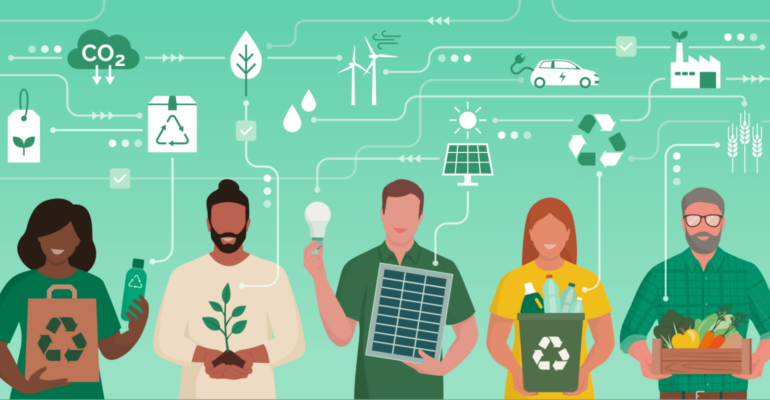You’ve probably heard — again and again — that it’s more important than ever to adopt a sustainable lifestyle to preserve our planet. But what does sustainability really mean?
To find out, we brought together four eco-leaders from different backgrounds in one webinar, How to Lead a Sustainable Lifestyle, and asked them to share their best actionable tips for environmentally friendly living. Their diverse answers reveal that there are many ways to increase sustainability. Chances are you’re doing some of them already — and you could probably integrate a few more sustainability practices into your lifestyle without much extra effort. Here are each speaker’s top three tips for a sustainable lifestyle.

Nathan Kipnis, FAIA of Kipnis Architecture + Planning
Kipnis explained that buildings are responsible for approximately 40% of energy use in the U.S., and offered a wealth of advice for saving energy (and money!) at home.
- Phase out gas appliances in favor of today’s highly efficient electric furnaces, HVAC systems, induction ranges, heat pump water heaters and dryers. Eliminating gas improves indoor air quality (for your health) and reduces methane leaking into the atmosphere (for the planet, because methane traps even more heat than carbon dioxide).
- Make sure your home is as energy-efficient as possible, with excellent insulation and tight seals.
- Consider adding solar panels. The price has come down sharply in the past few years, so solar panels pay for themselves in just a few years — and then provide free electricity!
Pat Townsley of Creekside Pizza & Taproom
Townsley says he put sustainability first in developing his restaurant in San Anselmo, CA, a family-friendly place focused on beer and pizza.
- Cook using electricity — even professional chefs don’t need gas or a wood-fired pizza oven to get great-tasting results.
- Try to eliminate single-use plastic or plastic-lined food-ware from your life. At the restaurant, they need to offer plastic cups to kids but they reuse them.
- Reduce and consolidate deliveries and errands as much as possible to save on fuel, transportation costs and emissions.
Dawn Agnew of Eco Terreno Wines & Vineyards
Hospitality expert Agnew discussed farm-to-fork sustainability.
- Avoid pesticides, herbicides, and rodenticides in your garden and in your food.
- Buy organic foods and beverages and talk to the farmers if you can. Find out what they’re doing to build up soil health, which matters both for the quality of our food and for absorbing excess carbon from the air and locking it into the soil.
- Do what you can for those in your community who need help with food and housing. Regeneration starts with the soil but extends to the community.
Sara Aminzadeh of the California Coastal Commission
Aminzadeh took us on a quick tour of sustainable choices she’s made in her own home.
- Reduce or eliminate your lawn to save water and fertilizer use. Instead, plant native species — they support our native pollinators and wildlife and need less additional water because they’re adapted to the climate.
- Think ahead when you leave the house for an errand or a day outside: You can avoid creating a bag of plastic trash by packing reusable water bottles, a coffee mug, straws, cloth shopping bags and a reusable set of cutlery.
- Switch to an electric or plug-in hybrid vehicle as soon as you can. Prices have come down significantly and in addition to reducing pollution in your neighborhood you’ll be sheltering yourself from big swings in gas costs.
Watch the full discussion below:
More from Better:
- Support Amazon Watch and Indigenous Peoples Throughout the Amazon Basin: On Earth Day, Your Donation’s Impact Will Be Doubled
- Fighting the Good Fight: 10 Inspirational Eco-Warriors Making an Impact in 2022 and Beyond
- Pay It Forward: Hawaii’s Malama Campaign Encourages Visitors to Give Back
 Anne-Christine Strugnell spent the first two decades of her career as a freelance writer for hi-tech firms while also publishing personal essays in MORE Magazine, Self, the Christian Science Monitor, and the Cup of Comfort series. In 2019, awareness of the climate crisis drove her to quit her day job to focus on environmental work. She is now an Al Gore-trained Climate Reality Leader and works as a volunteer for local environmental organizations including Resilient Neighborhoods and Environmental Forum of Marin.
Anne-Christine Strugnell spent the first two decades of her career as a freelance writer for hi-tech firms while also publishing personal essays in MORE Magazine, Self, the Christian Science Monitor, and the Cup of Comfort series. In 2019, awareness of the climate crisis drove her to quit her day job to focus on environmental work. She is now an Al Gore-trained Climate Reality Leader and works as a volunteer for local environmental organizations including Resilient Neighborhoods and Environmental Forum of Marin.

